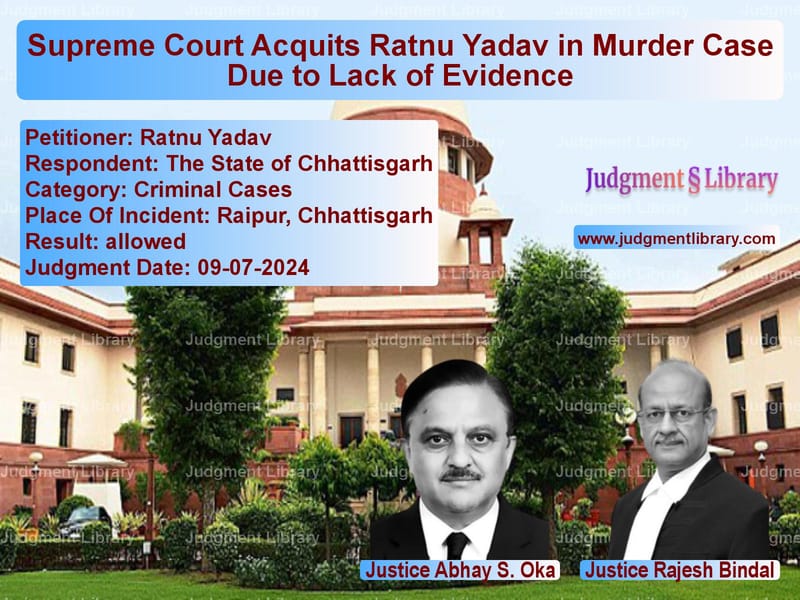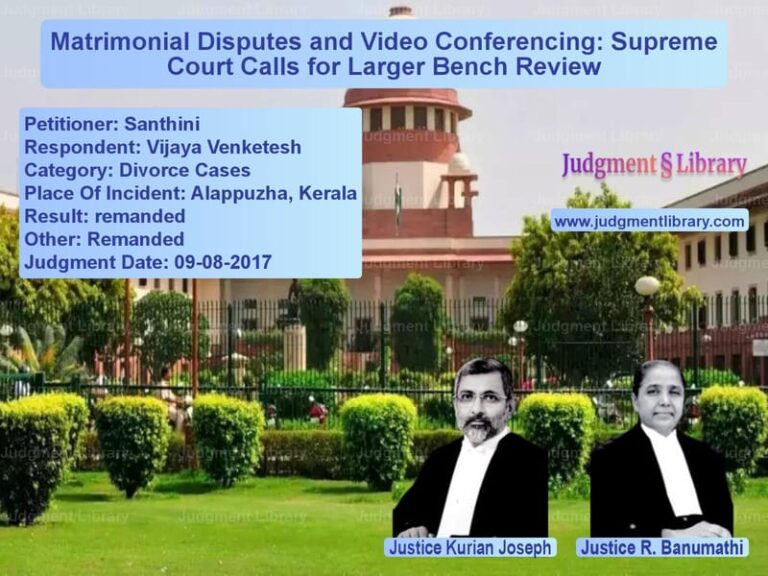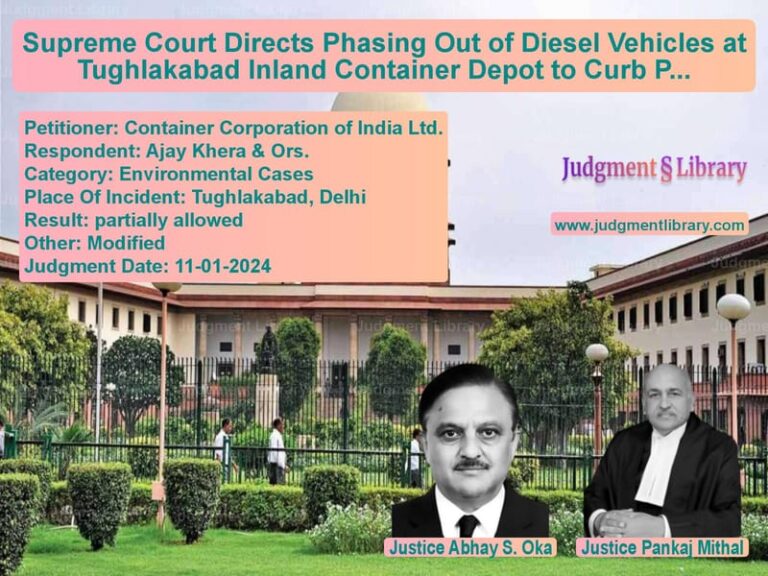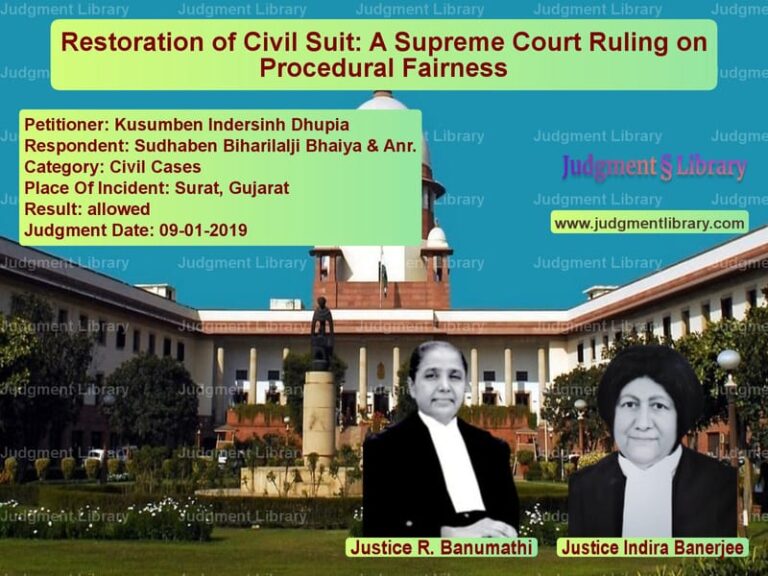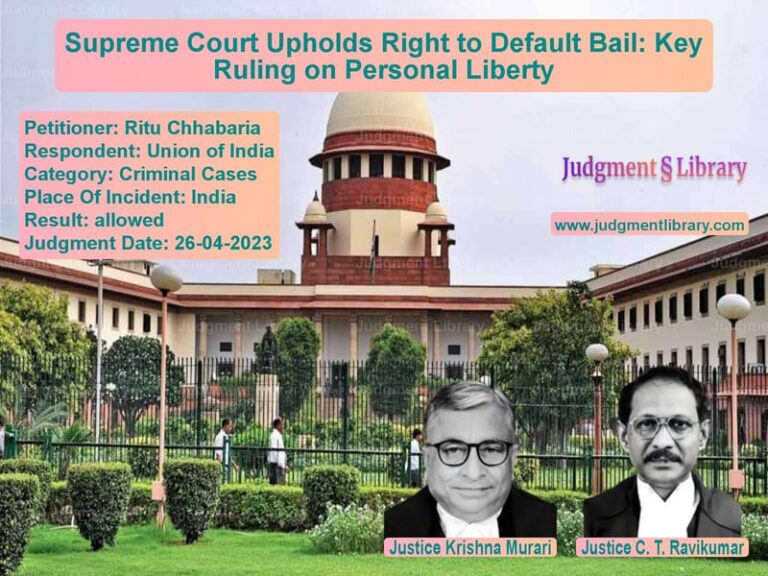Supreme Court Acquits Ratnu Yadav in Murder Case Due to Lack of Evidence
The Supreme Court of India, in a landmark judgment, acquitted Ratnu Yadav, who had been convicted of murdering his stepmother, Smt. Hemwati Bai. The case, which had been ongoing for over a decade, saw the accused spending 11 years in incarceration before the apex court finally ruled in his favor, citing insufficient evidence, unreliable witness testimony, and procedural lapses by the prosecution.
Background of the Case
The prosecution alleged that on March 2, 2013, Ratnu Yadav, owing to a land dispute, assaulted his stepmother and dragged her to a nearby pond, where he forcibly submerged her head in water, causing her death by drowning. The case was built primarily on circumstantial evidence, with the prosecution relying on an alleged extra-judicial confession made by the accused and the testimony of a witness who claimed to have seen Yadav dragging the deceased.
Initially, the Sessions Court convicted Yadav under Section 302 of the Indian Penal Code (IPC), sentencing him to life imprisonment. The High Court upheld the conviction, leading to an appeal before the Supreme Court.
Arguments by the Appellant
Senior advocate Shri Shridhar Y. Chitale, appearing as amicus curiae for the appellant, challenged the conviction on several grounds:
- The cause of death was attributed to drowning, but the prosecution failed to establish whether it was homicidal or accidental.
- PW-1, a village officer, was declared hostile, making her testimony unreliable.
- PW-5, the deceased’s brother, claimed he saw the accused dragging the deceased, but his testimony was uncorroborated.
- No injuries were found on the body, which contradicted the claim that the deceased was dragged forcefully.
- The forensic examination of water samples from the pond, which could have provided crucial evidence, was not conducted.
The defense argued that in the absence of direct evidence, the conviction was based on conjecture rather than proof beyond a reasonable doubt.
Arguments by the Respondent
Opposing the appeal, the prosecution, represented by Shri Prashant Singh, contended that:
- PW-1 confirmed during cross-examination that the accused had confessed to killing his stepmother.
- PW-5’s testimony established that the accused was last seen with the deceased, holding her by the hair.
- Although there were no eyewitnesses to the actual act of drowning, circumstantial evidence strongly suggested a homicidal death.
Supreme Court’s Analysis
The Supreme Court scrutinized the evidence and found several inconsistencies:
- The alleged extra-judicial confession was unreliable due to contradictions in PW-1’s statements.
- PW-5’s testimony lacked independent corroboration, raising doubts about its credibility.
- The forensic examination of water samples was abandoned without justification.
- The absence of injuries on the deceased suggested that she had not been forcibly dragged.
Referring to precedents, the Court reiterated that an extra-judicial confession must be corroborated by strong evidence. The absence of corroboration rendered the prosecution’s case weak.
Precedents and Legal Considerations
The Court cited several cases where extra-judicial confessions were deemed unreliable unless supported by independent evidence. It observed:
“It is a settled principle that an extra-judicial confession, if not corroborated, is weak evidence and should be approached with caution.”
Furthermore, the Court noted that the prosecution’s failure to examine key witnesses, including Lakhan, who was reportedly present during the incident, weakened the case.
Verdict
In its ruling, the Supreme Court stated:
“Considering what we have held earlier, the appellant’s guilt was not proved beyond a reasonable doubt. The appellant was incarcerated for 11 years. Hence, the impugned judgment and order dated 7th April 2018 and 9th July 2013 are hereby set aside. The appellant is acquitted of the offence.”
The Court ordered Yadav’s immediate release unless he was required in another case.
Implications of the Judgment
This case highlights the significance of due process in criminal trials. The Supreme Court’s verdict underscores the importance of proving guilt beyond a reasonable doubt and ensuring that circumstantial evidence is supported by strong corroboration.
For the legal fraternity, this ruling serves as a reminder that procedural lapses and unreliable testimonies can jeopardize the integrity of a case. It also brings attention to the necessity of forensic evidence in cases relying on circumstantial proof.
Conclusion
The acquittal of Ratnu Yadav serves as a crucial precedent in cases where the prosecution fails to establish guilt beyond doubt. It also highlights the need for stringent adherence to legal procedures and the careful evaluation of evidence in criminal trials.
With this judgment, the Supreme Court reaffirmed its commitment to upholding justice by ensuring that convictions are based on credible and corroborated evidence, not mere conjecture.
Petitioner Name: Ratnu Yadav.Respondent Name: The State of Chhattisgarh.Judgment By: Justice Abhay S. Oka, Justice Rajesh Bindal.Place Of Incident: Raipur, Chhattisgarh.Judgment Date: 09-07-2024.
Don’t miss out on the full details! Download the complete judgment in PDF format below and gain valuable insights instantly!
Download Judgment: ratnu-yadav-vs-the-state-of-chhatti-supreme-court-of-india-judgment-dated-09-07-2024.pdf
Directly Download Judgment: Directly download this Judgment
See all petitions in Murder Cases
See all petitions in Bail and Anticipatory Bail
See all petitions in Custodial Deaths and Police Misconduct
See all petitions in Judgment by Abhay S. Oka
See all petitions in Judgment by Rajesh Bindal
See all petitions in allowed
See all petitions in supreme court of India judgments July 2024
See all petitions in 2024 judgments
See all posts in Criminal Cases Category
See all allowed petitions in Criminal Cases Category
See all Dismissed petitions in Criminal Cases Category
See all partially allowed petitions in Criminal Cases Category

